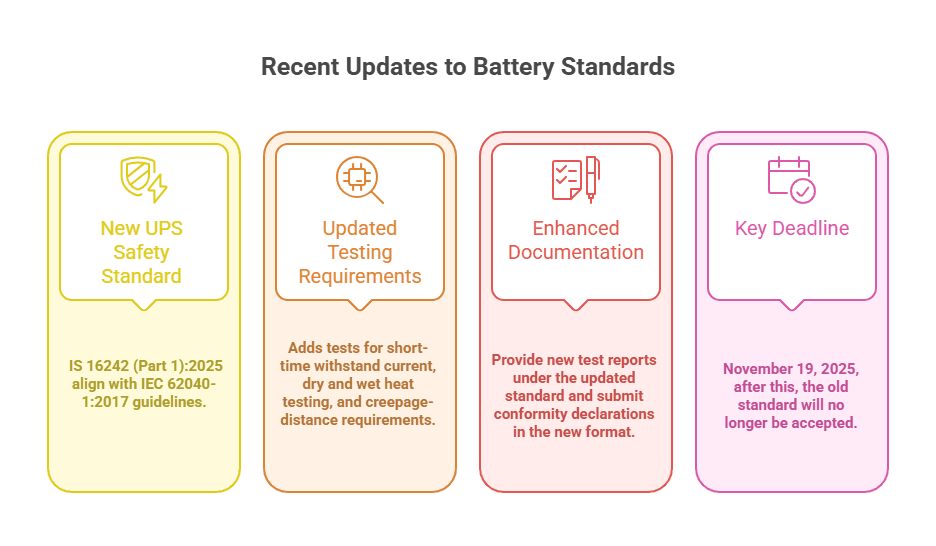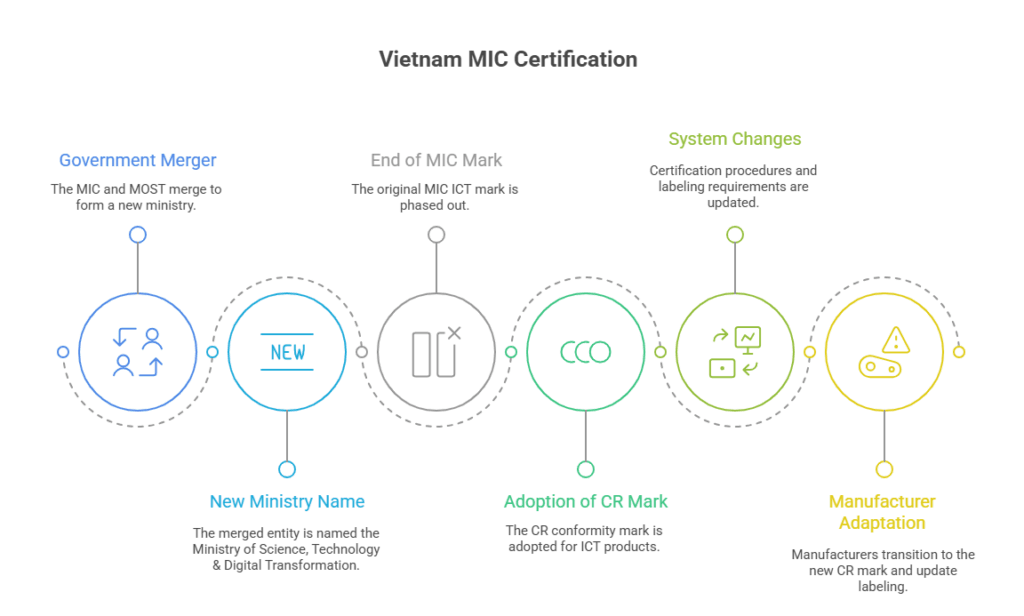In today’s global battery market, safety standards aren’t optional – they’re your ticket to doing business, as companies must meet these standards to sell their products worldwide.
With India and Vietnam recently updating their battery certification requirements and making testing and certification stricter, keeping up with these changes has become an essential part of staying in the game.
India BIS Certification Updates
BIS, or the Bureau of Indian Standards, is India’s national standards body, and BIS certification applies to a wide range of batteries, including lithium-ion, nickel-metal hydride, and coin cells. All of these batteries must obtain BIS approval before entering the Indian market.
The BIS compulsory registration scheme covers key safety requirements to ensure that batteries do not pose a hazard to users, so companies must not only follow specific testing standards but also provide the required documentation.
Recent Updates
India has recently introduced important changes to its battery standards, focusing on improved safety. Here are the key changes:
- New UPS Safety Standard:BIS just rolled out IS 16242 (Part 1):2025 last month, replacing their old 2014 standard. The new rules align with IEC 62040-1:2017 guidelines, bringing India’s battery standards up to current international benchmarks.
- Updated Testing Requirements:The standard adds tests for short-time withstand current and includes both dry and wet heat testing, while also tightening creepage-distance requirements.
- Enhanced Documentation:Companies must now provide new test reports under the updated standard and submit conformity declarations in the new format.
- Key Deadline:November 19, 2025, is the crucial date; after this, the old standard will no longer be accepted, so companies must switch to the new requirements by then.
Impact on Manufacturers
These new rules are a double-edged sword. While manufacturers will need to revamp their testing procedures, which takes time and money, it’s also a chance to prove they’re at the cutting edge of battery safety. They need to work closely with UPS manufacturers to ensure their batteries meet the new safety requirements.
Companies with existing certifications face time pressure to submit updated test reports before the deadline, while new applicants must comply with the revised standard from the outset to avoid delays or loss of certification.
Vietnam MIC Certification Updates
The Ministry of Information and Communications (MIC) oversees the certification of Information and Communication Technology (ICT) products in Vietnam, including lithium-ion batteries used in portable devices such as smartphones, tablets, and laptops. To legally sell these products in Vietnam, manufacturers must obtain the Vietnam MIC certification.
Regulatory Restructuring
Vietnam is undergoing significant governmental restructuring that impacts battery certification processes. Here’s what’s happening:
- Government Merger:On December 6, 2024, Vietnam initiated the reorganizing of The Ministry of Information and Communications (MIC) and the Ministry of Science and Technology (MOST) are joining together, creating a new ministry structure.
- New Ministry Name:The merged organization is called the Ministry of Science, Technology & Digital Transformation. Some sources call it MST. This restructuring aims to improve efficiency and streamline processes.
Impact on Certification
The government changes will affect battery certification in several ways:
- End of MIC Mark:The original MIC ICT mark is being phased out. Companies need to prepare for new marking systems.
- New Conformity Mark:The CR conformity mark, previously used by MOST, is being adopted across various product categories, including ICT products.
- System Changes:Certification procedures and labeling requirements are expected to evolve as the merger progresses. Manufacturers should anticipate updates to processes and prepare accordingly.
Impact on Manufacturers
These regulatory changes require battery manufacturers to plan proactively, including transitioning to the new CR conformity mark and updating product labeling to meet revised requirements.
How Battery Manufacturers Should React
The battery certification changes in India and Vietnam require smart responses. Companies need to act now to avoid problems later. The key guidelines include:
Stay Informed
Keep watching for updates from BIS, MIC, and other regulatory bodies by subscribing to official announcements and joining industry groups that share regulatory news.
Set up alerts for important deadlines and create a system to track changes across all your target markets. Getting reliable info quickly is your best defense against missing key changes.
Update Compliance Processes
Adjust your internal testing procedures to match new requirements, update documentation templates and forms, and change labeling processes for new marking systems.
In addition, train your team on the updated standards and review your quality control procedures regularly.
Engage Experts
Work with certification and testing partners like MCM to achieve efficient compliance, leveraging their expertise to navigate complex requirements and assist with documentation and testing processes. Let top testing partners handle battery certification and regulatory communications, which can save time and reduce mistakes.
Plan Ahead
Build regulatory changes into your product development timeline by starting compliance work early in the design phase and setting internal deadlines ahead of the official ones.
It’s also recommended to create backup plans for potential delays and to factor certification costs into your budget planning.
Partner with MCM
If you are looking for a reliable partner to navigate constantly changing battery certification regulations and avoid delays that could affect your product launch or market timing, MCM can help you stay ahead.
MCM is a reliable partner for battery testing and certification services. We specialize in helping manufacturers navigate complex regulatory requirements and offer comprehensive solutions for global battery compliance. The key advantages of partnering with us include:
- Global Expertise:With over 18 years of experience, MCM has successfully certified over 5,000,000 battery models and their end products, providing battery certification services covering more than 200 countries and regions worldwide.
- Regulatory Updates:We stay current with changing requirements, including updates from BIS, MIC, and the EU Battery Regulation, and provide timely information to clients to help companies prepare for new rules before they take effect.
- Custom Solutions:We offer tailored compliance strategies for each client, supporting a wide range of certifications, including UN38.3, CB, CCC, TISI, MIC, BIS, and more. Our solutions are customized to fit each product and market, ensuring batteries meet regulatory requirements across multiple regions efficiently.
Battery certification requirements are evolving rapidly in India and Vietnam. The BIS updates focus on improved safety standards and testing procedures, while Vietnam’s government restructuring is set to change MIC certification processes. Manufacturers must adapt quickly to stay compliant, and success depends on staying informed and acting early.
Working with experienced partners like MCM ensures a smooth navigation through these regulatory changes, helping companies maintain market access and support business growth. For more information, feel free to contact us.








